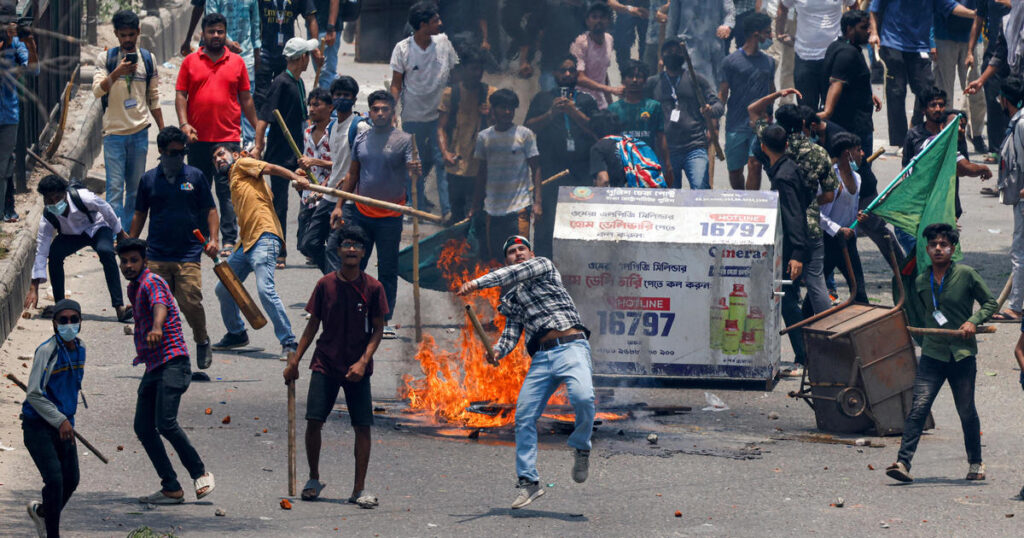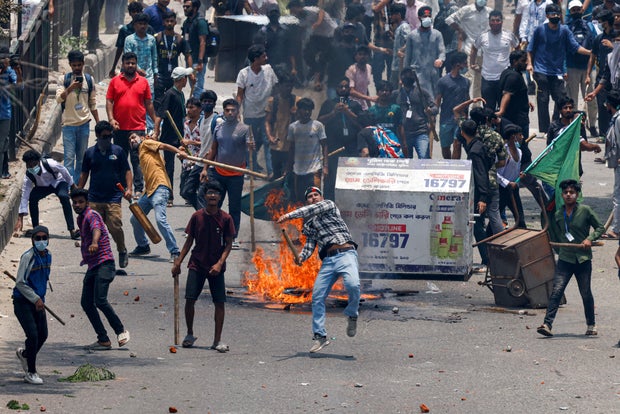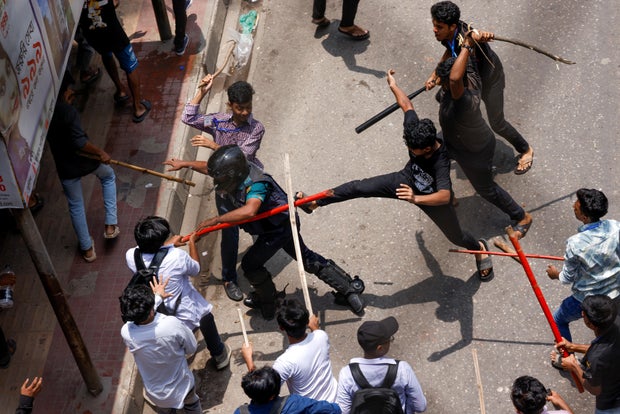The U.S. State Department has raised the travel advisory level for Bangladesh amid civil unrest in the South Asia country. Police have imposed a strict curfew with a “shoot-on-sight” order, and military forces are patrolling parts of the capital after scores were killed and hundreds injured in clashes over the allocation of civil service jobs.
The travel advisory urges Americans to reconsider travel to the South Asian country.
“Ongoing demonstrations and violent clashes have been reported throughout the city of Dhaka, its neighboring areas, and throughout Bangladesh,” the department said in a news release. “Telecommunications have been interrupted in Dhaka and across the country. Due to the security situation, there may be a delay in provision of routine consular services.”
Any Americans who do travel to Bangladesh should avoid demonstrations and political gatherings, monitor local media for news updates, and stay in touch with the State Department, the news release said.
The U.S. Embassy in Dhaka said Friday that reports indicated “hundreds to possibly thousands” were injured across Bangladesh. It said the situation was “extremely volatile.”
Mohammad Ponir Hossain/REUTERS
The “shoot-on-sight” curfew began at midnight and briefly relaxed from noon to 2 p.m. local time to allow people to run essential errands. The curfew is expected to last until 10 a.m. Sunday, allowing officers to fire on mobs in extreme cases, said lawmaker Obaidul Quader, the general secretary of the ruling Awami League party.
The demonstrations — called for mainly by student groups— started weeks ago to protest a quota system that reserves up to 30% of government jobs for relatives of veterans who fought in Bangladesh’s war of independence in 1971. Violence erupted Tuesday, with the Daily Prothom Alo newspaper reporting the death of at least 103 people.
Friday was likely to be the deadliest day so far; Somoy TV reported 43 killed, while an Associated Press reporter saw 23 bodies at Dhaka Medical College and Hospital, but it was not immediately clear whether they all died on Friday. On Thursday, 22 others were reported dead as protesting students attempted to “completely shut down” the country.
Bangladeshi authorities haven’t shared any official numbers of those killed and injured.
Protests lead to chaos, violence
Officials said the curfew was to quell further violence after police and protesters clashed in the streets and at university campuses in Dhaka and other cities across the South Asian country. Authorities blocked online communications by banning mobile and internet services. Several television news channels also went off the air, and the websites of most local newspapers were down. Meanwhile, some key government websites, including Bangladesh’s central bank and the prime minister’s office, appeared to have been hacked and defaced.
Local media also reported that some 800 inmates fled from a prison in Narsingdi, a district north of the capital, after protesters stormed the facility and set it on fire Friday.
The chaos highlights cracks in Bangladesh’s governance and economy and the frustration of youths who lack good jobs upon graduation. They also represent the biggest challenge to Prime Minister Sheikh Hasina since she won a fourth consecutive term in office after January’s elections, boycotted by the main opposition groups.
Protesters argue the quota system is discriminatory and benefits supporters of Hasina, whose Awami League party led the independence movement, saying it should be replaced with a merit-based system. Hasina has defended the quota system, saying that veterans deserve the highest respect for their contributions in the war against Pakistan, regardless of their political affiliation.
Mohammad Ponir Hossain/REUTERS
Representatives from both sides met late Friday in an attempt to reach a resolution. At least three student leaders were present and demanded the reform of the current quota system, the reopening of student dormitories shut by the police following the clashes and for some university officials to step down after failing to protect campuses from the violence. Law Minister Anisul Huq said late Friday the government was open to discussing their demands.
The main opposition Bangladesh Nationalist Party has backed the protests, vowing Friday to organize its own demonstrations as many of its supporters joined the students’ protests. However, BNP said in a statement its followers were not responsible for the violence and denied the ruling party’s accusations of using the protests for political gains.
The Awami League and the BNP have often accused each other of fueling political chaos and violence, most recently ahead of the country’s national election, which was marred by a crackdown on several opposition figures. Hasina’s government had accused the opposition party of attempting to disrupt the vote.
In 2018, the government halted the job quotas following mass student protests. But in June, Bangladesh’s High Court nullified that decision and reinstated the quotas after relatives of 1971 veterans filed petitions. The Supreme Court suspended the ruling, pending an appeal hearing, and said in a statement it will take the issue up Sunday.
Hasina has called on protesters to wait for the court’s verdict.



